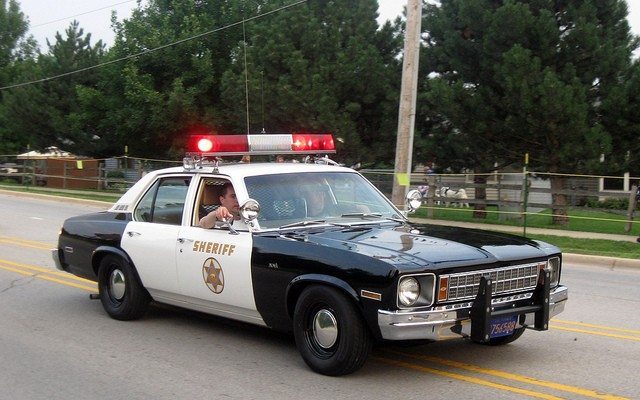
News
Colorado Sheriffs Say “No Way” to New Laws
The newest trend among small town sheriffs is a refusal to follow the laws of the land. What laws have caused such a visceral reaction from our law enforcement? One of the hottest topics in the American political sphere, of course. These sheriffs are refusing to follow newly enacted gun control laws.
The movement is especially popular in Colorado, although there have been issues in Florida, California, New York, and multiple other states as well. After the horrifying Aurora, Colo. and Newtown, Conn. shootings last year, state and federal leaders have attempted to put more gun control measures in place, but success has been varied.
Since the first whispers of proposed new gun laws began, there has been opposition among local sheriffs. One group, the Constitutional Sheriffs and Peace Officers Association, also known as CSPOA, has already announced that they would not enforce local, state, or federal gun control laws if they believe that the laws are unconstitutional. As of today, the CSPOA website lists 18 state sheriff organizations and many individual sheriffs. The founder, Richard Mack, is the former sheriff of Graham County, AZ. It also contains a section entitled “The Red Coat List,” presumably a Revolutionary War throwback reference to British soldiers who fought the newly formed United States armies. According to CSPOA, Red Coats are any individuals who try to undermine the the power of the sheriffs of CSPOA.
In March of this year, Colorado’s Governor John Hickenlooper signed new gun laws; they went into effect in July. They include universal background checks on gun purchases and a limit on the size of ammunition magazines, among other measures. The laws incited an incredibly reactionary response throughout the state. Two state senators who supported the laws were actually recalled just a few months later, and a third resigned to avoid a third vicious and expensive recall battle. So far, 55 of the 62 sheriffs in Colorado have stated that they will not follow these laws.
Reasons for refusal vary somewhat, but for the most part, these sheriffs claim that the laws are both unconstitutional and vague to the point of being ineffective. The sheriffs are almost all from rural areas–the few urban sheriffs who are following the news laws claim that they are absolutely enforceable. There are also some sheriffs who disagree with the law, but realize that it is part of their job description to comply, regardless of personal beliefs. These two types of officials are part of a minuscule minority in Colorado.
Acts of defiance are not the first steps that these Colorado sheriffs have taken. In May, a group filed a suit challenging the constitutionality of the laws in the State Court. US District Judge Martha Kreiger turned them down, stating that they didn’t have the legal authority or standing to file the case as sheriffs, although they could as a group of private citizens. There are other suits moving forward, and some of the sheriffs have signed on.
The problem with what’s happening in Colorado is that whether or not these laws are actually constitutional is a separate issue from the job for which these sheriffs have been elected. It is not a sheriff’s duty to make laws–that falls on the Legislature. Similarly, it is not a sheriff’s job to interpret a law–that falls on the Judicial system. A sheriff’s job is to enforce the laws that are enacted.
Now, what many sheriffs are doing is not focusing on the enforcement of these provisions and characterizing them as a very low priority, which is fine, and not entirely unexpected. Not all laws are enforced on the same level anywhere. I know for a fact that I have jaywalked dozens of times. Or, for a sillier example, let’s remember that in my home state of Connecticut, it’s technically illegal to dispose of a used razor. I can assure you, I have done so many times, and I’ve never had the police burst into my bathroom to arrest me. And if all these sheriffs were doing was characterizing these laws as a low priority, it would be bothersome, but in the grand scheme of things, alright.
But the sheriffs who have taken their crusade further worry me. They will face very few consequences–in some states, Governors can investigate sheriffs that don’t follow laws, but that provision is rarely enacted. Mostly, any challenge to these sheriffs will come from voters, but given that these sheriffs are almost exclusively in conservative rural areas, that’s unlikely.
Gun laws in this country will continue to be a grand debate, there’s no doubt about it. But when sheriffs, or former sheriffs, such as Mack, make statements such as, “every one of the sheriffs is going to follow the Constitution, not follow the president or the Supreme Court. The Supreme Court has already ruled twice for the Second Amendment. The federal government has no right to tell me how many magazines I can have, how many guns I can have and how much ammunition I can have,” we have a problem. Sheriffs should be focusing on counteracting the epidemic of gun violence in this country. If they don’t agree with the laws that are passed, that’s a well-deserved personal belief, but it’s still their job to enforce them. In order to make this country a safer place, we need to get on the same page. But right now, we’re not even reading the same book.
—
Anneliese Mahoney (@AMahoney8672) is Lead Editor at Law Street and a Connecticut transplant to Washington D.C. She has a Bachelor’s degree in International Affairs from the George Washington University, and a passion for law, politics, and social issues. Contact Anneliese at amahoney@LawStreetMedia.com.
Featured image courtesy of [Inventorchris via Flickr]








Comments